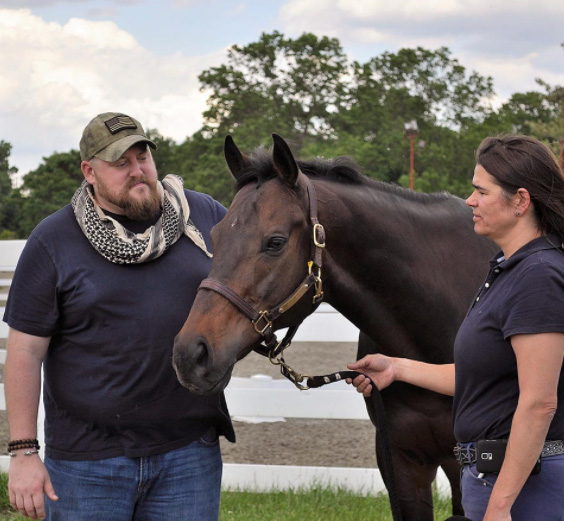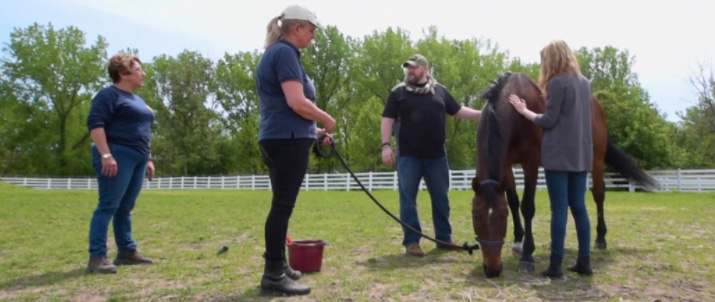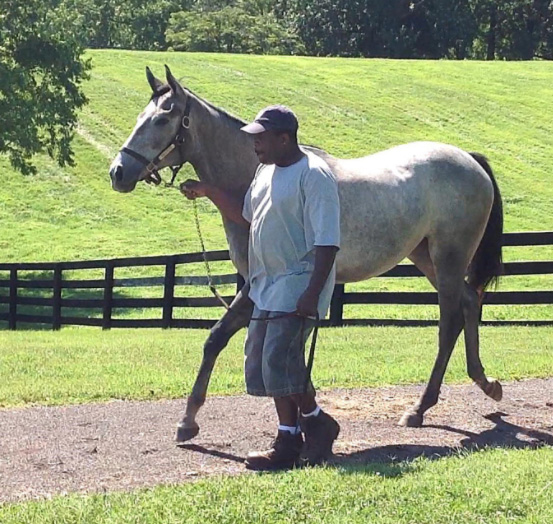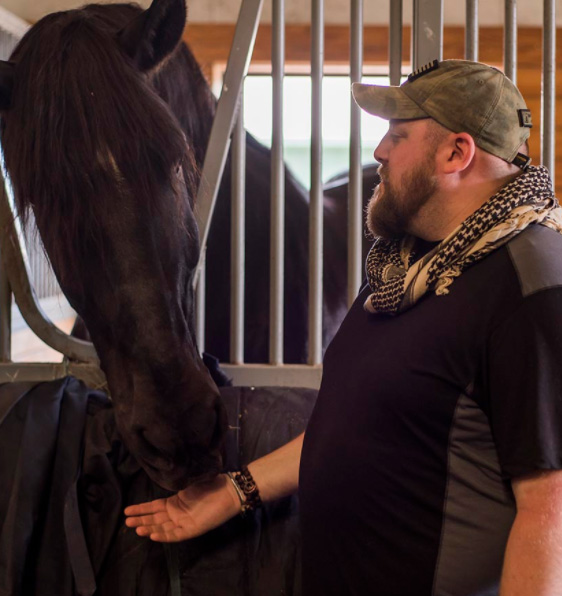
by Dan Ross
How long have humans been aware of the cruel psychological toll of war? For a clue, just turn to the Ancient Greeks, and the play Ajax, about a decorated general whose hellish recollections of battle drive him into deep depression and eventually to suicide.
For millennia then, we have recognized many of the conditions that now fall under the umbrella of Post Traumatic Stress Disorder (PTSD). And yet, beyond a handful of common treatments for PTSD with only so-so success rates, the medical establishment has largely ignored so called “alternative” treatments for which there’s overwhelming anecdotal evidence as to their benefits.
Until now, that is. Columbia University’s ongoing Man O’ War research project, scheduled to wrap this summer, seeks to finally confirm what has also been suspected since the heyday of Greek antiquity: that horses, whose hardwired flight instincts mirror in so many ways the human symptoms of PTSD, have the unique ability to help heal the mental wounds and scars of traumatized veterans.
“Even the best treatment currently is effective for no more than 50 to 60% of patients with PTSD,” said Yuval Neria, professor of medical psychology at Columbia and a co-director of the program. Which is why the patients involved in the Man O’ War Project are “looking for something more promising,” Neria said. “There’s a lot of room for improvement.”
The study aims to standardize the way horses can be used to help veterans with PTSD recover from the horrors of their past by producing a manual that other equine therapy programs–many of which vary in approach–can use as a blueprint to work with and from. And by standardizing and legitimizing equine therapy in this way, it could open the door much wider for more racehorses to be used in such programs once their racing careers end.
“I don’t know what all these other programs do. My impression is that some are experiential, without all that much structure,” said Prudence Fisher, associate professor of clinical psychiatric social work at Columbia, and another co-director of the study. “We believe PTSD is a very serious illness, and that, if you’re purporting to be treating people with a very serious illness, you want people to know a lot about the illness, and carefully assess people.”
The need is urgent for a PTSD therapy program with a proven high success-rate in veterans. Nightmares and troubled sleep are typical PTSD symptoms. Sufferers can also feel uncomfortable when out in public, making them hypervigilant and easily startled. Social isolation, loneliness, substance abuse, guilt and shame are other effects, and suicide is, sadly, far from uncommon.

It’s estimated that as many as 30 percent of veterans are affected by PTSD, and 7,300 veterans commit suicide every year, which breaks down to 20 suicides a day. Their deaths make up nearly 20 percent of all suicides in the U.S. annually. But current treatment methods like talk therapy, drug regimens and exposure therapy aren’t always effective at tackling the root problems, and these programs can have high drop-out rates, too.
But the early indicators for equine therapy are extremely promising indeed. The Man O’ War Project’s 2016 pilot study saw the severity of the PTSD symptoms in all eight participants reduced–in some, markedly so. That study used the CAPS scale, a clinical measure of PTSD severity, as a barometer of success or failure. And the improvement across the board was between 26 and 74%.
“Horses are hyper-sensitive animals and not easy to make friends with,” said Earle Mack, who has poured nearly $2 million of his own money into the project over the years through his Earle I. Mack Foundation (Columbia University assumed full rein of the project earlier this month).
Multi-hyphenate Mack–former 1st Lieutenant in the army, former ambassador to Finland, and a real estate developer–is a long-time racehorse owner, with horses spread between the U.S. and Europe. One of the things that makes equine therapy so effective, he believes, is that the trust of horses is hard-earned, and can’t be achieved through corners-cut.
“I always believe that when you feel you can do one thing right, and feel good about yourself, it will transfer to other areas,” Mack said. “They’ll feel better in life. They’ll interact better in their jobs and with their families.”
The study proper started last September, and 49 veterans–including the group of eight involved in the initial pilot–have gone, or are currently going, through the eight-week program. The researchers will cap the study at around 60 people. Around 40% of the veterans are female.
“We’ve had very few people drop out,” said Fisher. “Less than 10%.”
In contrast, some studies put the drop-out rate in veterans for certain exposure therapies as high as 50%.
So, what does the course actually look like?

Every week, groups of between three to six veterans roll up to the Bergen Equestrian Center, in New Jersey. Their 90-minute sessions with the horses are led by a mental health expert and “equine specialist,” and are book-ended by questionnaires that are used for clinical evaluation. As a safety precaution, a separate “wrangler” watches guard.
“I will say that we’ve had no accidents or anybody injured in doing this,” said Fisher, who added that most of the veterans had little to no prior experience with horses. “We recruit widely.”
During the sessions themselves, the veterans run through a series of non-riding exercises that are designed to build, brick by brick, the bonds of trust between veteran and horse.
“They’re basically practicing horse training, starting with grooming, then leading the horse with and without a lead and so on,” said Neria. “When you leave the horse and you see the horse following you, there’s a lot of overcoming of fear and a sense of danger.”
The ultimate aim is to work on and break down those psychological barriers that inhibit feelings of safety and security, said Neria. “And those barriers are experienced both by the veteran with the PTSD and the horse.”
At the beginning and the end of treatment, the patients also undergo a Magnetic Resonance Imaging (MRI) scan in order to capture any changes that occur in their brain.
“We need to be able to capture not only any symptoms in the patient, but also hard-core, objective data, to see whether this treatment has any influence on the brain,” said Neria.
Researchers also follow-up with the patients three months after their treatment ends.
Importantly, the veterans aren’t forced to address and “talk about their trauma” as part of the program, “so they’re really focusing on their interactions with the horses,” said Fisher. “They’re focusing on what they’re feeling right now.”
This slightly different approach to other more established therapies is perhaps another reason why the Man O’ War Project has shown such positive results so far.
“If you go into an office where somebody’s waiting to go into a therapy session, they don’t look much like they’re looking forward to it,” said Fisher. “But at the barn, the patients can’t wait to fill out their forms and get out there. It’s a very different vibe.”

But it’s not just for veterans that the Man O’ War Project promises such bright possibilities–the project also harbors tremendous potential in the field of racehorse aftercare.
“Their next job isn’t always going to be an athletic endeavor,” said Stacie Clark, operations consultant with the Thoroughbred Aftercare Alliance. “Finding them successful careers as horses that can be useful in therapy, especially in dealing with post traumatic stress, is so important.”
The similarities between veteran and Thoroughbred is an integral reason why ex-racehorses are an ideal fit for the role, said Clark.
“They both have this program that they’re put into, whether it’s serving in the military or serving humanity, so they both play this service role. And it’s this service element why they can both relate to each other.”
With the study poised to wrap this summer, the next chapter of the project will be an educational one. The specifics are a little amorphous at the moment, but according to Anne Poulson, president of the Man O’ War Project, this next phase could include educational centers for representatives from other equine therapy programs to attend in order to learn Columbia University’s approach, as well as the broader distribution of the “very well thought out and tested” training manual.
Funding for the education phase still hasn’t been nailed down, although Poulson said that the project is currently seeking out foundational grants and corporate support. She said that anyone interested in donating or finding out more about the project should contact the foundation directly (address provided below).
As for Earle Mack, a driving force for many years behind the whole project, he has one eye on the wider implications from the study.
“We think this can transform to help children who suffer from some kind of traumatic stress disorder, too–not just veterans,” he said. “It really does help people with PTSD. It’s all quite amazing, really.”
Research Foundation of Mental Hygiene:
Columbia University Medical Center Attn: Man O’ War Project 150 Broadway, Suite 301, Riverview Center Menands, NY 12204
Find out more about this type of therapy in our section about Therapeutic Riding
This article was originally published on Thoroughbred Daily News and is reprinted here with permission.
All photos are from the Man O' War Project and are used by permission.


































